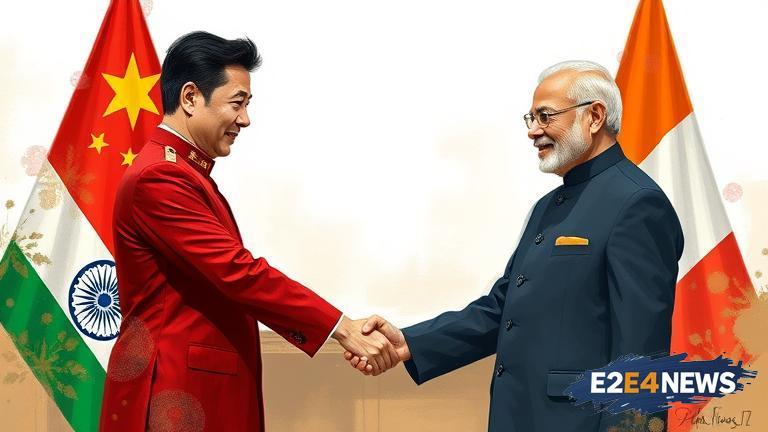The relationship between China and India has undergone a substantial transformation in recent years, with both nations making concerted efforts to strengthen their diplomatic ties and foster a spirit of cooperation. This paradigm shift is largely driven by the realization that their mutual interests and benefits outweigh their historical differences. The two countries have been engaged in a series of high-level talks and negotiations, aimed at resolving long-standing issues and exploring new avenues for collaboration. One of the key areas of focus has been the development of trade and commerce, with China and India seeking to increase bilateral trade and investment. The Chinese government has been actively courting Indian businesses, offering attractive incentives and investment opportunities. In response, Indian companies have been expanding their presence in the Chinese market, with several major players establishing operations in the country. The two nations have also been working closely on regional and international issues, including climate change, terrorism, and global governance. China and India have been coordinating their positions on key multilateral forums, such as the BRICS grouping and the Shanghai Cooperation Organization. Furthermore, they have been engaging in joint military exercises and defense cooperation, aimed at promoting mutual understanding and trust. The Indian government has also been seeking to leverage China’s expertise in infrastructure development, with a focus on upgrading its transportation networks and energy systems. China, on the other hand, has been looking to tap into India’s vast consumer market and IT sector. The two countries have also been exploring opportunities for cooperation in the fields of science and technology, education, and culture. Despite these positive developments, there are still several challenges that need to be addressed, including the long-standing border dispute and competing interests in the region. However, the overall trajectory of the relationship suggests that China and India are committed to building a more stable and cooperative partnership. The shift in their relations is also being driven by the changing global landscape, with both countries seeking to assert their influence and play a more prominent role in regional and international affairs. The United States, in particular, has been watching the developments in China-India relations with great interest, as it seeks to navigate its own relationships with these two major powers. The European Union has also been engaging with both China and India, as part of its efforts to promote multilateralism and cooperation in the Indo-Pacific region. As the relationship between China and India continues to evolve, it is likely to have significant implications for the broader region and the world at large. The two countries have the potential to play a major role in shaping the global agenda, and their cooperation could have a positive impact on issues such as climate change, sustainable development, and global security. However, there are also risks and challenges associated with their growing partnership, including the potential for competition and rivalry in the region. Ultimately, the future of China-India relations will depend on the ability of both countries to manage their differences and build a more stable and cooperative partnership. With the right approach and mindset, they can work together to address common challenges and promote a more peaceful and prosperous world. The international community will be watching their relationship closely, as it continues to unfold and evolve in the coming years. The shift in China-India relations is a significant development that will have far-reaching implications for the region and the world. It is a testament to the ability of nations to put aside their differences and work towards a common goal. As the world becomes increasingly interconnected, the importance of cooperation and diplomacy cannot be overstated. The relationship between China and India is a prime example of how nations can come together to promote peace, stability, and prosperity. The future of their partnership is bright, and it has the potential to be a game-changer for the region and the world.
